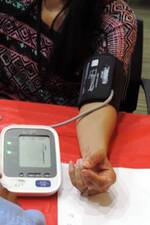Author Interviews, Ophthalmology, Technology / 01.04.2022
Breakthrough for Nearsightedness: Removable Lens Implant Can Provide Freedom from Glasses or Contacts
MedicalResearch.com Interview with:
Scott D. Barnes, MD
Chief Medical Officer
STAAR Surgical
 MedicalResearch.com: What is the background for the EVO procedure? Would you briefly describe what is meant by myopia and how common it is?
Response: EVO is a clinically-proven implantable lens that corrects common vision problems such as nearsightedness and nearsightedness with astigmatism. EVO can be the solution for people who want to get rid of their glasses or contact lenses. Myopia (or nearsightedness) is the most common ocular disorder worldwide and its incidence is increasing significantly. An estimated 30% of the world's population, or 2.6 billion people, have myopia and this number is projected to rise to 50% of the global population by the year 2050.
(more…)
MedicalResearch.com: What is the background for the EVO procedure? Would you briefly describe what is meant by myopia and how common it is?
Response: EVO is a clinically-proven implantable lens that corrects common vision problems such as nearsightedness and nearsightedness with astigmatism. EVO can be the solution for people who want to get rid of their glasses or contact lenses. Myopia (or nearsightedness) is the most common ocular disorder worldwide and its incidence is increasing significantly. An estimated 30% of the world's population, or 2.6 billion people, have myopia and this number is projected to rise to 50% of the global population by the year 2050.
(more…)
 MedicalResearch.com: What is the background for the EVO procedure? Would you briefly describe what is meant by myopia and how common it is?
Response: EVO is a clinically-proven implantable lens that corrects common vision problems such as nearsightedness and nearsightedness with astigmatism. EVO can be the solution for people who want to get rid of their glasses or contact lenses. Myopia (or nearsightedness) is the most common ocular disorder worldwide and its incidence is increasing significantly. An estimated 30% of the world's population, or 2.6 billion people, have myopia and this number is projected to rise to 50% of the global population by the year 2050.
(more…)
MedicalResearch.com: What is the background for the EVO procedure? Would you briefly describe what is meant by myopia and how common it is?
Response: EVO is a clinically-proven implantable lens that corrects common vision problems such as nearsightedness and nearsightedness with astigmatism. EVO can be the solution for people who want to get rid of their glasses or contact lenses. Myopia (or nearsightedness) is the most common ocular disorder worldwide and its incidence is increasing significantly. An estimated 30% of the world's population, or 2.6 billion people, have myopia and this number is projected to rise to 50% of the global population by the year 2050.
(more…)


















 Arman A. Shahriar
Medical Student, University of Minnesota Medical School Research
Consultant, HealthPartners Institute
Minneapolis, Minnesota
Arman A. Shahriar
Medical Student, University of Minnesota Medical School Research
Consultant, HealthPartners Institute
Minneapolis, Minnesota





 Response: Cigarette smoking is one of the well-established causes of periodontitis, but the effect of using electronic cigarettes (e-cig), especially its long-term impact on periodontal health, is not yet clearly understood. Considering the increased popularity of e-cig use, especially among teenagers and young adults, and the known effect of high nicotine concentration in e-cigarette products, we conducted this clinical research to see if there were differences in periodontal health between e-cig users, traditional smokers, and nonsmokers. The study consisted of two visits, 6 months apart, where measures of oral and periodontal health were obtained.
Our data showed significantly greater clinical attachment loss in the e-cigarette users and cigarette smokers than in the non-smokers at both study visits. In only e-cigarette users, we observed an over 0.2 mm average increase in the clinical attachment loss after 6 months.
Response: Cigarette smoking is one of the well-established causes of periodontitis, but the effect of using electronic cigarettes (e-cig), especially its long-term impact on periodontal health, is not yet clearly understood. Considering the increased popularity of e-cig use, especially among teenagers and young adults, and the known effect of high nicotine concentration in e-cigarette products, we conducted this clinical research to see if there were differences in periodontal health between e-cig users, traditional smokers, and nonsmokers. The study consisted of two visits, 6 months apart, where measures of oral and periodontal health were obtained.
Our data showed significantly greater clinical attachment loss in the e-cigarette users and cigarette smokers than in the non-smokers at both study visits. In only e-cigarette users, we observed an over 0.2 mm average increase in the clinical attachment loss after 6 months. 



